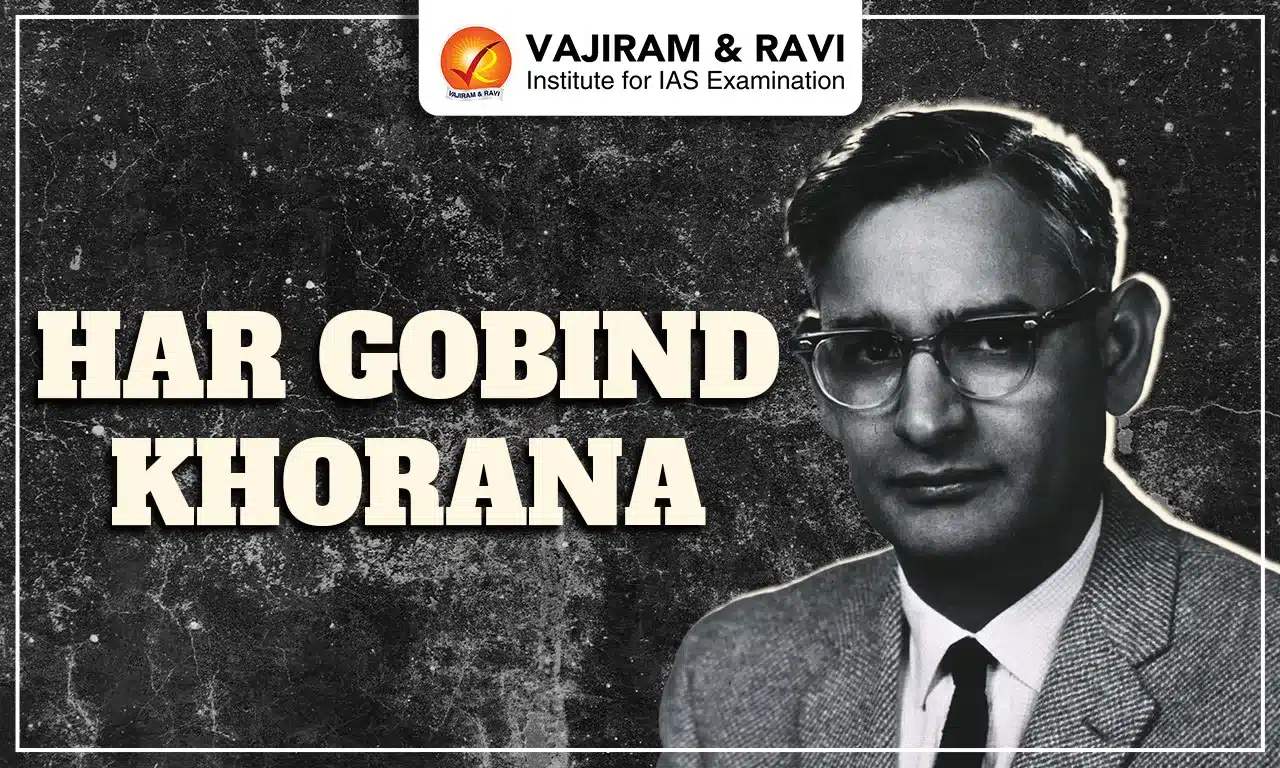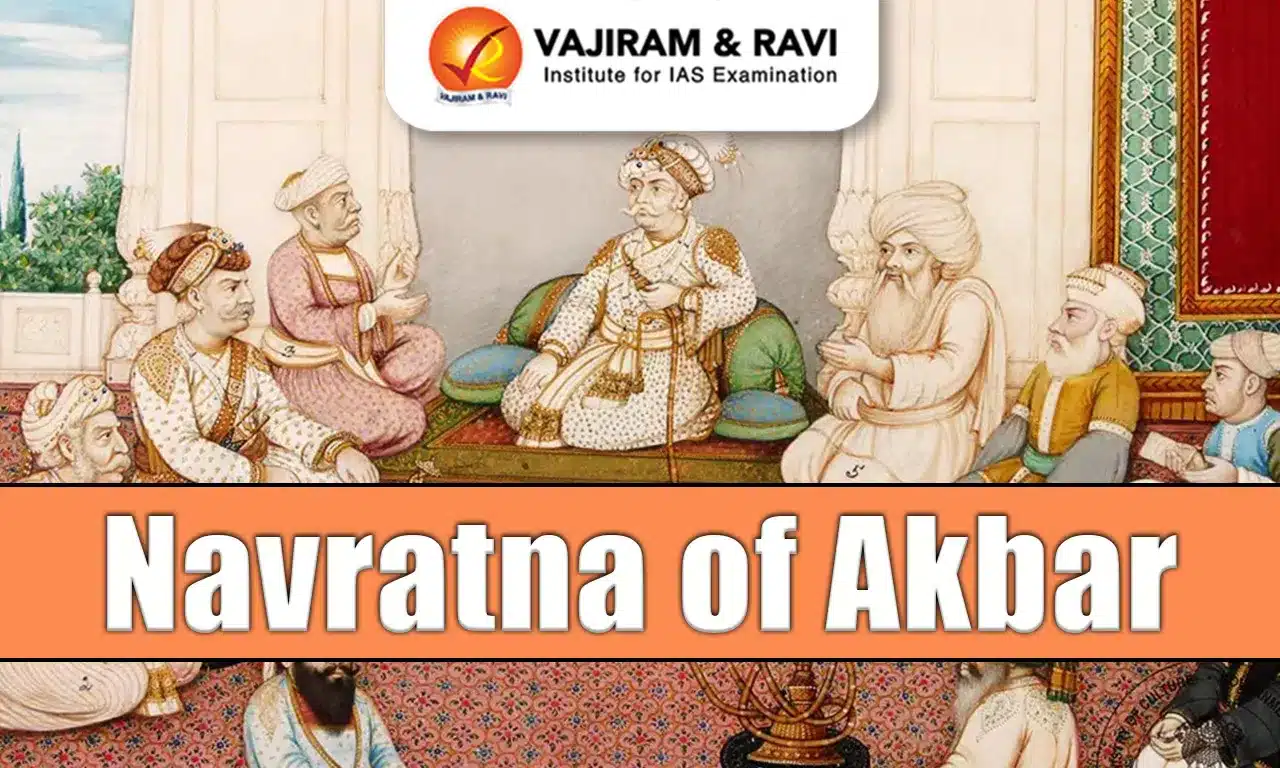Har Gobind Khorana, an Indian-American biochemist, received global acclaim for his groundbreaking contributions to molecular biology. In the 1960s, Har Gobind Khorana, in collaboration with his team, unravelled the mysteries of the genetic code, elucidating how DNA sequences determine amino acid arrangements in proteins. This monumental achievement earned him, along with Marshall W. Nirenberg and Robert W. Holley, the 1968 Nobel Prize in Physiology or Medicine.
Life of Har Gobind Khorana
Dr. Har Gobind Khorana was an Indian-American biochemist known for his significant contributions to the field of DNA and RNA.
- Har Gobind Khorana was born on January 9, 1922, in Raipurnow (now part of Pakistan).
- After completing his elementary education at the village school, Har Gobind Khorana attended Punjab University in Lahore.
- He joined the University of Liverpool, where he earned a Ph.D. in Organic Chemistry in 1948.
- Cambridge University: Har Gobind Khorana worked with Nobel laureate Sir Alexander Todd.
- Here, he began foundational work on nucleic acids, which eventually led to his groundbreaking discoveries regarding the genetic code.
Career
Har Gobind Khorana's career spanned several decades and numerous esteemed institutions across different countries.
- In 1960,Har Gobind Khorana joined the University of Wisconsin, Madison, where he became a part of the Institute for Enzyme Research.
- In 1970, Khorana joined the Massachusetts Institute of Technology (MIT) as the Alfred P. Sloan Professor of Biology and Chemistry.
- After retiring from MIT in 2007, Khorana continued to be active in the scientific community, attending conferences and staying updated with the latest research, until his death in 2011.
Contribution of Har Gobind Khorana
Har Gobind Khorana was a pioneering figure in the fields of molecular biology and biochemistry. Some of his major contributions are listed below:
Elucidation of the Genetic Code
In the 1950s, it was established that genetic information is transferred from DNA to RNA to protein.
- The 1960s witnessed significant efforts to decipher the genetic code.
- Genetic code refers to the instructions contained in a gene that tell a cell how to make a specific protein.
- Khorana's meticulous experiments helped establish the codon sequences of RNA that correspond to each amino acid in proteins.
- This work was instrumental in understanding the language of life at the molecular level.
- Knowing the genetic code opened the doors to the fields of genetic engineering and synthetic biology.
- Nobel Prize (1968): Har Gobind Khorana, along with two other scientists, were awarded Nobel prize for "for their interpretation of the genetic code and its function in protein synthesis."
Chemical Synthesis of DNA
Khorana and his team were at the forefront of efforts to chemically synthesize DNA.
- In a groundbreaking experiment, they became the first to successfully synthesize a gene in a living cell.
- Their methods and techniques have since become foundational in biotechnology and genetics, allowing scientists to manufacture DNA in the lab and modify it for various applications, including medical therapies and genetic engineering.
Exploration of DNA Polymerases
DNA polymerases are pivotal enzymes that facilitate the replication of DNA, ensuring the transmission of genetic information from one generation to the next.
- Through diligent research, Har Gobind Khorana and his team advanced world’s understanding of these enzymes, elucidating their roles, mechanisms, and importance in the complex process of DNA replication.
- His insights laid the groundwork for further studies on DNA replication machinery, aiding in understanding mutations, DNA repair mechanisms, and implications in diseases like cancer.
Development of Oligonucleotide Synthesis
Khorana's research often required custom DNA sequences, leading him to develop techniques for synthesizing short stretches of DNA, known as oligonucleotides.
- Hence, he introduced efficient methodologies that streamlined the synthesis process, making it more accessible and reliable.
- Significance: The ability to synthesize oligonucleotides has immense importance in modern biotechnology and medicine. They're used in a range of applications, from genetic testing and research to drug development and gene therapy.
Confirmation of the Universal Genetic Code
- Before Khorana's work, it was proposed but not confirmed that the genetic code was consistent across different organisms.
- Prof. Khorana provided substantial evidence supporting the universality of the genetic code across diverse life forms.
- This discovery has profound implications. It means that knowledge gained from studying the genetics of one organism can often be applied to others, enabling advancements in medicine, agriculture, and other domains.
Mentorship and Building Scientific Capacity
Beyond his research, Khorana was a dedicated educator and mentor.
- Har Gobind Khorana trained numerous budding scientists, many of whom have made significant contributions to molecular biology and associated fields.
- His commitment to building scientific capacity ensured that his influence would extend far beyond his personal research.
- He believed in the power of collaborative science, working with various researchers worldwide and creating a network of knowledge and innovation.
Delving into the Molecular Mechanisms of Vision
- Later in his career, Har Gobind Khorana became fascinated by the molecular processes behind vision.
- He delved deep into understanding the chemistry of the retina and the processes it uses to capture and process light. This led to insights into certain types of genetic blindness.
- His work in this realm has implications for understanding genetic disorders of vision and potential therapeutic interventions.
Awards and Recognition received by Har Gobind Khorana
Dr. Har Gobind Khorana received several awards and recognitions. A few of the major awards and recognitions are:
- Nobel Prize in Physiology or Medicine (1968): Along with Marshall W. Nirenberg and Robert W. Holley for their contribution in deciphering the genetic code and its role in creating proteins.
- Royal Society (London): He waselected as a foreign member of the society.
- Albert Lasker-Basic Medical Research Award (1968): This award is often referred to as "America's Nobel" and was conferred upon Khorana for his research on the genetic code.
- Padma Vibhushan (2018, posthumously)
- National Medal of Science (1987): From the President of the United States, this medal recognizes Khorana's in-depth research and contributions to the field of molecular biology.
Last updated on February, 2026
→ UPSC Notification 2026 is now out on the official website at upsconline.nic.in.
→ UPSC IFoS Notification 2026 is now out on the official website at upsconline.nic.in.
→ UPSC Calendar 2026 has been released.
→ Check out the latest UPSC Syllabus 2026 here.
→ Join Vajiram & Ravi’s Interview Guidance Programme for expert help to crack your final UPSC stage.
→ UPSC Mains Result 2025 is now out.
→ UPSC Prelims 2026 will be conducted on 24th May, 2026 & UPSC Mains 2026 will be conducted on 21st August 2026.
→ The UPSC Selection Process is of 3 stages-Prelims, Mains and Interview.
→ Prepare effectively with Vajiram & Ravi’s UPSC Prelims Test Series 2026 featuring full-length mock tests, detailed solutions, and performance analysis.
→ Enroll in Vajiram & Ravi’s UPSC Mains Test Series 2026 for structured answer writing practice, expert evaluation, and exam-oriented feedback.
→ Join Vajiram & Ravi’s Best UPSC Mentorship Program for personalized guidance, strategy planning, and one-to-one support from experienced mentors.
→ UPSC Result 2024 is released with latest UPSC Marksheet 2024. Check Now!
→ UPSC Toppers List 2024 is released now. Shakti Dubey is UPSC AIR 1 2024 Topper.
→ Also check Best UPSC Coaching in India
Tags: har gobind khorana quest


















